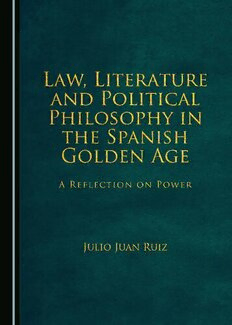
Law, Literature and Political Philosophy in the Spanish Golden Age: A Reflection on Power PDF
Preview Law, Literature and Political Philosophy in the Spanish Golden Age: A Reflection on Power
Law, Literature and Political Philosophy in the Spanish Golden Age Law, Literature and Political Philosophy in the Spanish Golden Age : A Reflection on Power By Julio Juan Ruiz Law, Literature and Political Philosophy in the Spanish Golden Age: A Reflection on Power By Julio Juan Ruiz This book first published 2020 Cambridge Scholars Publishing Lady Stephenson Library, Newcastle upon Tyne, NE6 2PA, UK British Library Cataloguing in Publication Data A catalogue record for this book is available from the British Library Copyright © 2020 by Julio Juan Ruiz All rights for this book reserved. No part of this book may be reproduced, stored in a retrieval system, or transmitted, in any form or by any means, electronic, mechanical, photocopying, recording or otherwise, without the prior permission of the copyright owner. ISBN (10): 1-5275-4427-3 ISBN (13): 978-1-5275-4427-7 CONTENTS Acknowledgements .................................................................................. vii Introduction ................................................................................................ 1 Part One Chapter 1 .................................................................................................... 5 Law and Literature: Power and its Limits in Pedro Calderón de la Barca’s Theatre Plays Chapter 2 .................................................................................................. 19 Machiavelli and the Reason of State in Two Stage Plays by Calderón de la Barca Chapter 3 .................................................................................................. 35 Reason and Passion in Legal Discourse Chapter 4 .................................................................................................. 57 Èmile Durkheim’s Sociology in M.A.K. Halliday’s Language as Social Semiotic Part Two Chapter 5 .................................................................................................. 69 Niccolò Machiavelli in the Political Thought of the Spanish Golden Century Chapter 6 .................................................................................................. 81 Religion and Machiavelli’s Philosophy Chapter 7 .................................................................................................. 91 Saavedra Fajardo in Sor Juana Inés de la Cruz’s Allegorical Neptune: Two Concepts of Power vi Contents Chapter 8 ................................................................................................ 105 The Staging of Power in Pedro Calderón de la Barca’s Theatre Plays Chapter 9 ................................................................................................ 117 Medieval Tradition and Modern Political Realism in Calderón de la Barca’s Theatre Plays Chapter 10 .............................................................................................. 129 Catholic Reason of State and Pedro Calderón de la Barca’s Stage Plays Chapter 11 .............................................................................................. 141 Political Persuasion and Religious Indoctrination in Pedro Calderón de la Barca’s Theatre Plays Bibliography ........................................................................................... 155 ACKNOWLEDGEMENTS The author would like to thank Inés Alvarez for translating this book into English, and special thanks are due to the Chancellor’s Department of Mar del Plata National University whose scholarships program made this work possible. INTRODUCTION In these times of specialisation, the different branches of knowledge are experiencing dramatic growth. However, this seems to be an inward growth in which every discipline makes enormous progress in its own field while getting increasingly detached from the rest. However, our world is not a compartmentalised unit, but a huge set of interactions where each existing thing, to a greater or lesser extent, influences the others, to constitute a whole reality. If knowledge continues growing into separate compartments, we will probably become unaware of how the real world functions. During Antiquity and again in the Renaissance, a wise person was one who dominated various disciplines and applied their respective tenets to their mutual improvement. I believe that this is true wisdom. The different sciences can offer their resources to create an interdisciplinary net which will result in a genuine expansion of knowledge and its consequent benefits for human life. Luckily, in recent years, interdisciplinary work has become increasingly frequent, first in natural sciences, and more recently, in social sciences, where some specialists have been already acknowledged for their contributions to the development of collaborative work among their respective fields. The present work is intended to be a sample of the advantages of interdisciplinary work in Law, Literature, and Political Sciences. It consists of a collection of articles which appeared in academic media from various countries, with a common thread through them: the issue of power in the Early Modern period. In this research, literature plays a fundamental role, since it is not a mere instrument of study, but the point of departure for multiple analyses in the areas of law and philosophy. I have organised this work into two parts. The first one addresses the relationship between law and literature, according to a trend known as Law in Literature, applied mainly in Continental Europe. This movement focuses on the analysis of law issues which appear in literary texts. The second part of the book addresses the relationship between political philosophy and literature. In this interdisciplinary relationship, also, literature is not only used to create stylistic resources, but to analyse philosophical problems as well.
